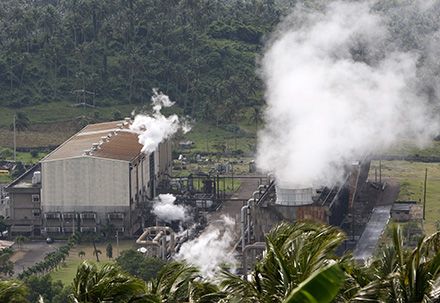A geothermal power project in the Philippines has raised hopes that Asia’s capital markets can play a bigger role in financing sustainable infrastructure projects.
Aboitiz Power issued Asia-Pacific’s first climate bonds in March to refinance its Tiwi-MakBan plant, after obtaining Ps12.5bn (US$263.4m) in credit facilities and guarantees.
The deal stands out as a rare capital markets financing for an infrastructure project in Asia, where companies have traditionally relied on bank lending to fund long-term developments.
The key to maximizing the impact of the deal, however, will be replicating the structure for other infrastructure assets across the region.
The facilities comprise climate bonds of Ps10.7bn, to be backed with a guarantee from ADB, and a direct ADB loan of Ps1.8bn. Under the guarantee, ADB will provide credit enhancement for 75% of principal and interest on the bonds, with the support of Credit Guarantee & Investment Facility. Bank of the Philippine Islands was the sole lead manager and bookrunner on the bonds.
“Credit-enhanced project bonds offer an attractive alternative to bank financing and, by mobilizing cost-effective, long-term capital, can help close the region’s infrastructure gap,” said Todd Freeland, director general of ADB’s private sector operations department.
The operator of the power plant is AP Renewables (APRI), which will also be the issuer of the bonds. Proceeds from the issue will be used partially to redeem APRI’s redeemable preferred shares and partially to fund the operating expenditure and future rehabilitation needs of the power plant.
While the ADB would like to reproduce the format elsewhere, insiders acknowledge that the use of proceeds is a challenge for a multilateral development bank.
The ADB and its peers prefer to focus their finite financial resources on greenfield projects, where they can demonstrate the biggest development impact. Refinancings are rare and multilaterals often shy away from deals that allow the project sponsor to take out a dividend – as was the case for Aboitiz.
Bond markets, meanwhile, have yet to develop an appetite for greenfield project risk. Institutional investors prefer to see evidence of stable cashflows, a solid offtake contract and predictable production or generation capacity.
Geothermal projects require a significant amount of upfront costs, and steam generation can drop off quickly, adding to the risk for lenders. In the case of Tiwi MakBan, however, Aboitiz had invested its own equity to rehabilitate and upgrade an existing asset with a proven generation history and the ADB’s credit enhancement helped it normalise the project’s capital structure.
“There are now some precedents for project bonds, and we have seen great interest from commercial banks,” said Christopher Thieme, director for infrastructure finance in the ADB’s private sector department. “Increasingly local currency solutions are becoming available as local sophistication is growing.”
The Tiwi-MakBan power complex was acquired from the state-run National Power Corp in 2009. ADB has been involved in the project since August 2014, when Aboitiz started looking to refinance its equity investments. ADB’s guarantee will be made in conjunction with CGIF, which will mark its first involvement in a project bond.
Geothermal assets are attracting interest from global sponsors with the sale of US oil major Chevron’s Asian portfolio, valued at an estimated US$3bn.
Equity analysts have also welcomed the additional source of financing. Shares in US-listed Ormat Technologies, which made the generators for the Tiwi plant, are up 14% this year. JP Morgan said the company stood to benefit from the issuance of credit-enhanced Green bonds, “a source of finance that could support development of geothermal energy resources in developing nations”.
This is the first Asian bond offering to be certified by the Climate Bonds Initiative, a UK-based NGO that promotes green finance. The ADB says these are also the first climate bonds for a single project in an emerging market, as well as the first such notes to be issued in local currency in the Philippine power industry.
“Geothermal energy development will play an important part of the shift to a low-carbon economy,” said CBI chief executive officer Sean Kidney. “The Philippines and Indonesia, in particular, have enormous geothermal potential; we expect this bond to be the first of many in the region.”
To view all special report articles please click here and to see the digital version of this report please click here.
To purchase printed copies or a PDF of this report, please email gloria.balbastro@thomsonreuters.com.
